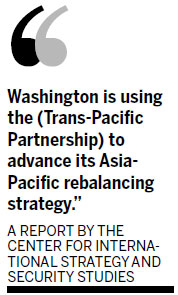US trade pacts 'undermine China's economic security'
By Zhang Yunbi (China Daily) Updated: 2014-05-07 07:13Washington's pursuit of free trade pacts spanning two oceans will undermine China's economic security, a report by a leading Chinese think tank warned.
The Obama administration's push for the Trans-Pacific Partnership and the Trans-Atlantic Trade and Investment Partnership, which will integrate the economies of the United States and its allies, has sparked widespread debate and concern in those countries as it could threaten some key sectors and some vested interests.
The "Two-Ocean Strategy" aims to "regain world economic hegemony, break down current regional cooperation frameworks and enforce market-oriented Western economic systems dominated by the US", according to the report on China's national security studies, which was released on Tuesday.
Chinese specialists have voiced their worries that Washington is trying to build a new world trade order to further isolate China and override the function of the World Trade Organization.
A "proactive response" is the best policy China should take to deal with the impact of the US' strategy, according to the report by the Center for International Strategy and Security Studies under the University of International Relations in Beijing.
Jin Canrong, a professor of international relations at Renmin University of China in Beijing, said Washington is trying to make up ground after China achieved a good engagement in the WTO framework after entering the organization.
"Then Washington came up with another new set of rules presented by TPP and TTIP, which have higher thresholds than those in the WTO, that favors the trading strength of the US and will frame China," Jin said.

Japanese Prime Minister Shinzo Abe told a US congressional delegation on April 14 that "even if China joins the deal at a later date, it will have to abide by our common rules", Japanese newspaper Yomiuri Shimbun reported.
Jiang Yuechun, director of the Department for World Economy and Development at the China Institute of International Studies, said Washington is advocating higher trade standards partly because it is losing comparative advantage in the world trade order.
"The WTO framework is more favorable for emerging economies that have seen rapid growth in their trade in the past decade", and China is benefiting from its entry into the WTO, Jiang said.
The two-ocean strategy has already influenced the Asia-Pacific region, observers said.
The annual report warned that APEC cooperation will be weakened, as one of the goals of TPP is to cover all APEC members.
"Washington is using the TPP to advance its Asia-Pacific rebalancing strategy" and has already impacted other regional free trade systems, the report said.
Meanwhile, prominent figures have not shied away from the goal of containing China while discussing the trade talks.
European Commissioner for Trade Karel De Gucht gave a speech in Berlin on Monday about what the EU needs to make the TTIP work, warning that "China may soon be the biggest economy in the world".
"As a result, both the EU and the US will have less weight in the future than we do today," De Gucht said as quoted by the Belgian newspaper New Europe.
Once the two trade agreements are inked, Washington "enjoys an absolute advantage when bargaining with China", and Beijing may find itself trapped and at the mercy of the others, whether it joins the TPP or not, the report predicted.
"By building the TPP and TTIP frameworks, the US will easily regain its dominance in setting rules to prevent China from taking a ride in the globalization process, undermine the competitive advantage of Chinese enterprises and finally contain China's rise," the report warned.
Chen Fengying, a writer of the annual report and director of the Institute of World Economic Studies under the China Institute of Contemporary International Relations, suggested that China proactively participate in the TPP talks while promoting negotiations on the Regional Comprehensive Economic Partnership and mapping out the blueprint of the APEC free trade zone.
zhangyunbi@chinadaily.com.cn










